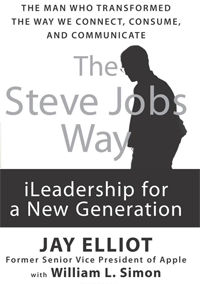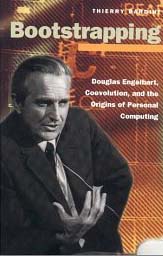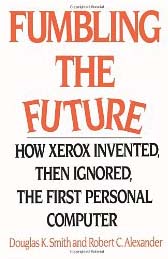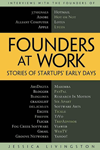| Bit Pop Revolution: Gli Hippie che inventarono il futuro | 1977-1987 - Quando il Computer divenne Personal | |

Amazon Review L'alba del personal computer non si poteva vedere dalle vetrate dei grandi edifici di IBM, Xerox o General Electric. L'inizio della rivoluzione digitale è senza brand e senza grandi investimenti, ma nasce semplicemente da un'idea: il potere del computer deve essere disponibile a tutti. I frequentatori dell'Home Computer Club di Menlo Park, nel cuore della Silicon Valley, erano talmente convinti di questo che erano disposti, pur di riuscirci, a costruirseli da soli. Lee Felsenstein, Fred Moore, Gordon French, ma anche Steve Jobs, Steve Wozniak e, almeno in spirito, Bill Gates, contribuirono alla realizzazione del sogno. Questo libro racconta la storia di hippie, attivisti, pacifisti, ingegneri, fuoricorso, ma soprattutto di nerd, che tra la fine degli anni '60 e la metà degli anni '70 dedicarono tutte le loro energie a liberare il potere del computer per renderlo disponibile al mondo. Il resto, come si dice, è storia. Autori: Tomaso Walliser e Cecilia Botta |
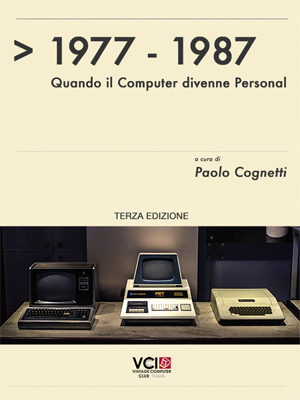
E' sempre difficile riassumere in poche righe quello che un libro vuole raccontare, essendo l'essenza del suo contenuto legata all'autore, al suo contesto e al tempo di riferimento. Lo è ancora di più quando un'opera conta più co-autori che, spinti dalla propria passione, decidono di dedicare tempo ed energie per condensare in uno spazio limitato, anni di dedizione e notti insonne passate alla riscoperta di eventi e fatti che vengono dati per scontati ma che tali spesso non sono, presentando aneddoti ed eventi che hanno contribuito a cambiare totalmente il mondo in cui oggi viviamo. 1977-1987 - Quando il Computer divenne Personal, sotto la regia di Paolo Cognetti (conosciuto nei meandri del retrocomputing italiano come il "Boss"), si propone come un opera rivolta ai curiosi e a coloro che vogliono scoprire il decennio cardine in cui "freddi" e "oscuri" ... Autori: Paolo Cognetti e co. |
|
|
Il Codice delle Invenzioni, da Leonardo da Vinci a Steve Jobs (Video Promo) |
Federico Faggin, il padre del Microprocessore (richiedi direttamente una copia del libro a StoriaInformatica.it) |
|
|
Anche se fortemente imparentata con l'ingegneria e le scienze più razionali, l'invenzione ci appare ancora oggi come un processo misterioso, quasi magico. Come per la magia, anche nel mondo dell'invenzione, la creazione del nuovo, del mai visto, dell'inaspettato, colpisce e spiazza il senso comune: da dove viene l'idea, qual è il trucco che la rende possibile? E così, gli inventori, oggi come nel passato, vengono percepiti come veri e propri maghi, a volte relegati dalla storia in ruoli da avanspettacolo e poi dimenticati, a volte celebrati come moderni eroi sul palcoscenico dell'innovazione. Questo libro, grazie a esempi concreti e a una accurata narrazione, svela alcuni 'trucchi' dell'affascinante e complesso processo dell'invenzione e spiega come è mutata negli ultimi secoli la percezione sociale dell'inventore, da Leonardo da Vinci a Steve Jobs, passando attraverso le avvincenti biografie di James Watt, Guglielmo Marconi e Thomas Alva Edison. Questo volume è stato realizzato con la collaborazione del Museo nazionale della Scienza e della Tecnologia Leonardo Da Vinci. Autore: Massimo Temporelli |
Autore: Angelo Gallippi |
|
| The Steve Jobs Way: iLeadership for a New Generation | Idea Man: A Memoir by the Cofounder of Microsoft | |
|
Amazon.com Review In iLeadership, Jay Elliot gives the reader the opportunity of seeing Steve Jobs as only his closest associates have ever seen him, and to learn what has made him--and the mystique of his management style--capable of creating tools so extraordinary that they have remade three industries and have transformed the way we create, consume, and communicate with each other. Jay shares the lessons that come out of Steve's intuitive approach to show how the creative and technological brilliance of iLeadership can be utilized to drive breakthroughs in any organization, irrespective of size.
|
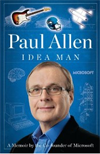 Amazon.com Review Amazon.com Review
"The entire conversation took five minutes. When it was over, Bill and I looked at each other. It was one thing to talk about writing a language for a microprocessor and another to get the job done . . .If we'd been older or known better, Bill and I might have been put off by the task in front of us. But we were young and green enough to believe that we just might pull it off." Paul Allen, best known as the cofounder of Microsoft, has left his mark on numerous fields, from aviation and science to rock 'n' roll, professional sports, and philanthropy. His passions and curiosity have transformed the way we live. In 2007 and again in 2008, Time named him one of the hundred most influential people in the world.
|
|
| Bootstrapping: Douglas Engelbart, Coevolution, and the Origins of Personal Computing | The Microsoft File : The Secret Case against Bill Gates | |
|
How and why this occurred as it did is the focus of Bardini's research, and students of creativity and the history of computing will have fits of ecstasy that he has compiled his work so accessibly. Better still, Bootstrapping shows research done right and is essential reading for R&D types everywhere. --Rob Lightner |
|
|
| Fumbling the Future: How Xerox Invented, then Ignored, the First Personal Computer | iWoz: Computer Geek to Cult Icon: How I Invented the Personal Computer, Co-Founded Apple, and Had Fun Doing It | |
|
Editorial Reviews Fumbling the Future tells how one of America's leading corporations invented the technology for one of the fastest-growing products of recent times, then miscalculated and mishandled the opportunity to fully exploit it. It is a classic story of how innovation can fare within large corporate structures, the real-life odyssey of what can happen to an idea as it travels from inspiration to implementation. |
Authors: Steve Wozniak, Gina Smith If you want to understand how the Apple fairy tale began in the seventies, then iWoz is a must read. This is the personal story of Steve Wozniak, inventor of the Apple computer. This book explains the long process that led Wozniak to create the first affordable computer, how he met Steve Jobs, and how they founded the Apple empire. This easy-to-read book reveals a captivating story aimed at everyone interested by the debut of personal computing. |
|
| Showstopper! The Breakneck Race to Create Windows NT and the Next Generation at Microsoft | The Ultimate History of Video Games | |
|
Author: G. Pascal Zachary Showstopper is the story of Windows NT. How it all started as a command prompt OS and became a graphical user interface system following the success of Windows 3.0. The author takes you to the very heart of Microsoft’s project team where you’ll meet not only David Cuttler, the brilliant and brutal architect behind the operating system, but most of the engineers and project leaders involved in the development of Windows NT. See how some of the team members literally sacrificed their family and social life to make this thing work in time. While this is not a technical book, software developers as well as project leaders, and anyone interested by Microsoft products, will have a hard time pulling their eyes away from it. |
For you gamers out there, this is THE ultimate book to own. To understand where your favorite game console comes from, you need to know the story behind the pinball, the pong, and the development of the first consoles such as the Atari 4600. In this 624-page brick of a book, Kent covers all the angles, anecdotes and humorous stories, such as the rename of Puck-Man to Pac-Man to avoid an unfriendly rename starting with the letter “F”. Trust me, if you are either a passionate gamer or even a game developer, this is a must-have for your bookshelf. |
|
| The Google Story | Does IT Matter? | |
|
Blinded by their arrogance and syndrome of God, too many IT managers are missing the whole point behind information and technology, which is to provide commodities, as Carr claims. IT must stop focusing on following technology and should realign its mission behind the concept of providing solutions to fulfill business needs. And just as the steam engine, railroad, telegraph and electricity, technology evolves to a point where manpower decreases substantially, and IT will be no exception. This is a must-read for high-level management! I recommend everyone involved in IT to keep this book on their bedside table. |

Author: Nicholas G. Carr Blinded by their arrogance and syndrome of God, too many IT managers are missing the whole point behind information and technology, which is to provide commodities, as Carr claims. IT must stop focusing on following technology and should realign its mission behind the concept of providing solutions to fulfill business needs. And just as the steam engine, railroad, telegraph and electricity, technology evolves to a point where manpower decreases substantially, and IT will be no exception. This is a must-read for high-level management! I recommend everyone involved in IT to keep this book on their bedside table. |
|
| Hackers | On The Edge: The Spectacular Rise and Fall of Commodore | |

Authors: Steven Levy, Steven Levy In this book, the word “hackers” does not refer to bad guys taking control of your Windows 98 PC or sending e-mail viruses. Hackers in this book are people who improved primitive systems by hacking electronics, thereby increasing their computing power and efficiency. In a period where computers were looked at like lab rats, university researchers and early developers such as Lee Felsenstein, Bill Gates and Steve Wozniak, pushed their limits and literally inspired what would be one day be seen as the computer revolution. Hackers offers a peek at a very formative time in geekdom and is worth reading no matter what year it is. |
Raise your hand those who once owned a Commodore 64? God, I would pay a lot of money to go back to the 1980s when the C64 was the king of the hill. This particular book, however, is not about hot rods. The story of Commodore is about very affordable family computers. This book starts at the very beginning of Commodore, when they acquired MOS Technologies, a semiconductor manufacturer, that lead to the development of the PET. Once the PET was history, then came the VIC-20, followed by the Commodore 64, which is known as the most sold computer of all time. The story even introduces the 128, the Amiga, and the end of Commodore. How could such a successful company fall so abruptly from the top of the world? This is what you will find out if you get yourself a copy of On The Edge. Definitely one to buy for the Commodore lover. And while you’re at it, check out this VIC-20 TV ad to remember the good old days. |
|
| Wikinomics: How Mass Collaboration Changes Everything | The Second Coming of Steve Jobs | |

Authors: Don Tapscott, Anthony D. Williams The Web, and Web 2.0 in particular, has changed our lives and is currently changing our entire economy. New possibilities inspired by social network groups and mass collaboration are smashing down boundaries, creating endless new business models for Internet companies. This book will definitively change your thinking and enlighten you. If you still have a hard time picturing what the Web 2.0 is, read Wikinomics – once you’re done you’ll be a real Web 2.0 Ninja. Fabulous read, and a very popular title lately. |

Author: Alan Deutschman This is the story of Steve Jobs, starting from the moment he was pushed away from Apple in 1985, and following his story until his return in 1996. During his leave of absence, Jobs tried to revolutionize education with the NeXT Cube, his startup that never made it big. On the side though, he purchased Pixar, the company behind Toy Story, from George Lucas himself, and literally made a fortune with something he couldn’t care less about. Finally, his journey with NeXT ended when the company was purchased by Apple in 1996, bringing Jobs back to his mother company, and the rest is history. The story of Jobs’ post-1985 Apple career is captivating, and the author brings you a very well-written book that’s entertaining from the first to the very last page. |
|
| The Perfect Thing | I Leoni della Silicon Valley | |
|
Author: Steven Levy What’s the coolest gadget of the third millennium? The iPod, no doubt about it. This is one of the coolest books I’ve read in years. When you decide to write about such a cool thing, you need to deliver cool content, and Steven Levy does it amazingly. If you want to learn about the development of the iPod, how it changed Apple, the music industry, and the way consumers buy their favorite songs, then you need to get a copy of the perfect book: The Perfect Thing. Just check out how cool the book cover is!
Founders at Work: Stories of Startups' Early Days "All the best things that I did at Apple came from (a) not having money and (b) not having done it before, ever." – Steve Wozniak, Apple
Founders at Work tells of the early struggles for independence and acceptance of many of modern technology's giants. Their stories are told through personal interviews that are at times hilarious, at times painful, but always inspiring. The personalities represented in this book are role models for all startup wannabes who are committed to their visions and want to know what the sacrifices (and excitement) are like. |
Storie appassionanti, vite straordinarie di dieci italiani di successo di cui Fiorella Kostoris e Gianfranco Rossi hanno raccolto le testimonianze. Biografie accomunate da una stessa vicenda: la scelta, inevitabile o perseguita, di abbandonare il Bel Paese alla volta degli Stati Uniti. Lì, nella Silicon Volley, hanno creato le loro imprese, hanno trovato i capitali per realizzare le invenzioni più sorprendenti dei nostri tempi e sono diventati a loro volta operatori di venture capital per incentivare le imprese di altri ricercatori. Il successo del mouse si deve, per esempio, a un italiano, fondatore della Logitech; grazie agli studi di un italiano è nata l'insulina artificiale, pietra miliare della biotecnologia. Italiani, dunque, popolo di creativi, di intelligenze brillanti e produttive nei più disparati ambiti della scienza, della ricerca tecnologica, dell'innovazione. Cervelli condannati o predestinati a un futuro da migranti? Di sicuro la costruzione pro-attiva del proprio curriculum professionale e la mobilità personale, quale paradigma della globalizzazione, sono oggi in Italia spesso frustrate e si declinano ineludibilmente in una vera e propria "fuga" di cervelli. Potrà mai l'Italia, strutturalmente caratterizzata nell'epoca contemporanea da una scarsa propensione al rischio, da eccessive burocrazie e politicizzazioni, da insufficienti investimenti nel capitale umano e nella ricerca, riuscire a fermare questo esodo di eccellenze e ad attirarne di esterne? |

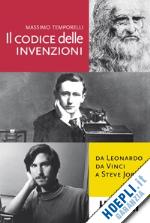 Hoepli Review
Hoepli Review Sapevate che il microprocessore- il “cervello" di tutti i dispositivi rigirali - è stato inventato da un italiano, Federico Faggin? Che la prima comunicazione integrata dati-voce è stata realizzata da una società fondata dallo stesso Faggin? Che un'altra società, sempre di Faggin, ha prodotto Io “schermo sensibile” dei telefonini e il touchpad da notebook? Se avete risposto “no" ad almeno una domanda questo è il libro per voi, perché vi troverete tutti i dettagli inediti della storia di successo di un italiano straordinario. Dal primo computer, costruito alla Olivetti a soli 19 anni, alla National Medal of Technology and Innovation conferitagli dal presidente Obama, dal microprocessore Z80, venduto nell'orco di tre decenni in tre miliardi di esemplari, alle cinque lauree honoris causa conferitegli da prestigiose università, questa biografia descrive le intuizioni, i successi e le difficoltà superate per perseguire con determinazione ed entusiasmo tanti importanti obbiettivi, con svariati dettagli e curiosità. Faggin ha avuto anche autorevoli candidature al Nobel, ultima delle quali quella di Rita Levi-Montalcini, che del libro ha scritto la prefazione.
Sapevate che il microprocessore- il “cervello" di tutti i dispositivi rigirali - è stato inventato da un italiano, Federico Faggin? Che la prima comunicazione integrata dati-voce è stata realizzata da una società fondata dallo stesso Faggin? Che un'altra società, sempre di Faggin, ha prodotto Io “schermo sensibile” dei telefonini e il touchpad da notebook? Se avete risposto “no" ad almeno una domanda questo è il libro per voi, perché vi troverete tutti i dettagli inediti della storia di successo di un italiano straordinario. Dal primo computer, costruito alla Olivetti a soli 19 anni, alla National Medal of Technology and Innovation conferitagli dal presidente Obama, dal microprocessore Z80, venduto nell'orco di tre decenni in tre miliardi di esemplari, alle cinque lauree honoris causa conferitegli da prestigiose università, questa biografia descrive le intuizioni, i successi e le difficoltà superate per perseguire con determinazione ed entusiasmo tanti importanti obbiettivi, con svariati dettagli e curiosità. Faggin ha avuto anche autorevoli candidature al Nobel, ultima delle quali quella di Rita Levi-Montalcini, che del libro ha scritto la prefazione.